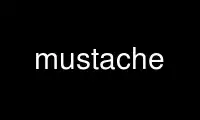
This is the command mustache that can be run in the OnWorks free hosting provider using one of our multiple free online workstations such as Ubuntu Online, Fedora Online, Windows online emulator or MAC OS online emulator
PROGRAM:
NAME
mustache - Mustache processor
SYNOPSIS
mustache <YAML> <FILE>
mustache --compile <FILE>
mustache --tokens <FILE>
DESCRIPTION
Mustache is a logic-less templating system for HTML, config files, anything.
The mustache command processes a Mustache template preceded by YAML frontmatter from
standard input and prints one or more documents to standard output.
YAML frontmatter begins with --- on a single line, followed by YAML, ending with another
--- on a single line, e.g.
---
names: [ {name: chris}, {name: mark}, {name: scott} ]
---
If you are unfamiliar with YAML, it is a superset of JSON. Valid JSON should work fine.
After the frontmatter should come any valid Mustache template. See mustache(5) for an
overview of Mustache templates.
For example:
{{#names}}
Hi {{name}}!
{{/names}}
Now let´s combine them.
$ cat data.yml
---
names: [ {name: chris}, {name: mark}, {name: scott} ]
---
$ cat template.mustache
{{#names}}
Hi {{name}}!
{{/names}}
$ cat data.yml template.mustache | mustache
Hi chris!
Hi mark!
Hi scott!
If you provide multiple YAML documents (as delimited by ---), your template will be
rendered multiple times. Like a mail merge.
For example:
$ cat data.yml
---
name: chris
---
name: mark
---
name: scott
---
$ cat template.mustache
Hi {{name}}!
$ cat data.yml template.mustache | mustache
Hi chris!
Hi mark!
Hi scott!
OPTIONS
By default mustache will try to render a Mustache template using the YAML frontmatter you
provide. It can do a few other things, however.
-c, --compile
Print the compiled Ruby version of a given template. This is the code that is
actually used when rendering a template into a string. Useful for debugging but
only if you are familiar with Mustache´s internals.
-t, --tokens
Print the tokenized form of a given Mustache template. This can be used to
understand how Mustache parses a template. The tokens are handed to a generator
which compiles them into a Ruby string. Syntax errors and confused tags, therefore,
can probably be identified by examining the tokens produced.
INSTALLATION
If you have RubyGems installed:
gem install mustache
EXAMPLES
$ mustache data.yml template.mustache
$ cat data.yml | mustache - template.mustache
$ mustache -c template.mustache
$ cat <<data | ruby mustache - template.mustache
---
name: Bob
age: 30
---
data
COPYRIGHT
Mustache is Copyright (C) 2009 Chris Wanstrath
Original CTemplate by Google
Use mustache online using onworks.net services
